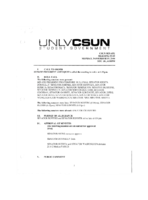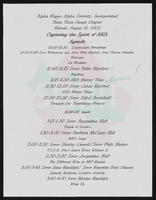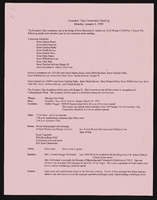Search the Special Collections and Archives Portal
Search Results

Meeting minutes for Consolidated Student Senate, University of Nevada, Las Vegas, November 15, 2004
Date
Archival Collection
Description
Text
Bethany Khan, Ken Liu, and Zachary Poppel (Culinary Union) oral history interview conducted by Elia Del Carmen Solano-Patricio: transcript
Date
Archival Collection
Description
From the Lincy Institute "Perspectives from the COVID-19 Pandemic" Oral History Project (MS-01178) -- Business interviews file.
Text

Alpha Kappa Alpha Sorority, Theta Theta Omega Chapter retreat and workshop documents
Date
Archival Collection
Description
From the Alpha Kappa Alpha Sorority, Incorporated, Theta Theta Omega Chapter Records (MS-01014) -- Chapter records file.
Text
MGM Mirage Records on Mandalay Resort Group
Identifier
Abstract
The MGM Mirage Records on Mandalay Resort Group consists of materials from Mandalay Resort Group’s office of public relations and community affairs records, which was closed after Mandalay’s corporate merger with MGM Mirage in 2005. The files, dating from 1968 to 2005, provide documentation of Mandalay Resort Group’s external affairs and internal operations. They contain subject files, photographs, negatives, slides, correspondence, VHS tapes, corporate publications, press releases, press kits, wholesale room agreements, hotel ephemera, employee newsletters, and press clippings. Of particular interest are files and photographs documenting the planning, development, construction, and opening of the Mandalay Resort Group properties.
Archival Collection

Alpha Kappa Alpha Sorority, Theta Theta Omega Chapter Founders Day committee reports
Date
Archival Collection
Description
From the Alpha Kappa Alpha Sorority, Incorporated, Theta Theta Omega Chapter Records (MS-01014) -- Chapter records file.
Text

Transcript of an interview with Kenneth Fong by Lois Goodall on February 22, 2014
Date
Archival Collection
Description
Text
J. T. McWilliams Family Papers
Identifier
Abstract
The collection consists of letters, greeting cards, survey maps, newspaper clippings, legal papers, photographs, collected recipes, land sales and expense journals, and survey reference books. The material was created or collected by pioneering Nevada surveyor, engineer, and real estate entrepreneur J. T. (John Thomas) McWilliams and his wife, Iona, between 1900 and 1968.
Archival Collection
Stocker Family Papers
Identifier
Abstract
The Stocker Family Papers (1860-1982) document the family’s personal, political, and business interests including Mayme Stocker’s 1931 Nevada gaming license and Harold Stocker’s involvement in the Nevada Republican party. The collection contains family correspondence, political documents and planning materials, and business records related to the family’s gaming and real estate interests.
Archival Collection
Bill Moore Professional Papers
Identifier
Abstract
The Bill Moore Professional Papers are comprised of documents, designs, and promotional materials of show producer Bill Moore from 1950 to 2010. From the 1960s until the late 2000s, Moore and his partner George Arnold produced a variety of stage shows, from musicals and revues to his famous "on ice" productions like Nudes on Ice and Playgirls on Ice. Materials include three-dimensional set designs, photographic prints, financial records, promotional posters, and audio and video recordings of shows at casinos in Las Vegas, Laughlin, and Reno, Nevada, and Atlantic City, New Jersey.
Archival Collection
Las Vegas, Nevada Strip Hotel Labor Relations Collection
Identifier
Abstract
The Las Vegas, Nevada Strip Hotel Labor Relations Collection comprises legal documents, correspondence, and human resources manuals and pamphlets related to labor in the hospitality industry on the Las Vegas Strip in Nevada from 1963 to 2008. The majority of documents involve the Culinary Union, the Bartenders Union, the Teamsters Union, MGM Mirage affiliated hotel casinos, the Dunes Hotel, and the Sands Hotel and Casino.
Archival Collection
